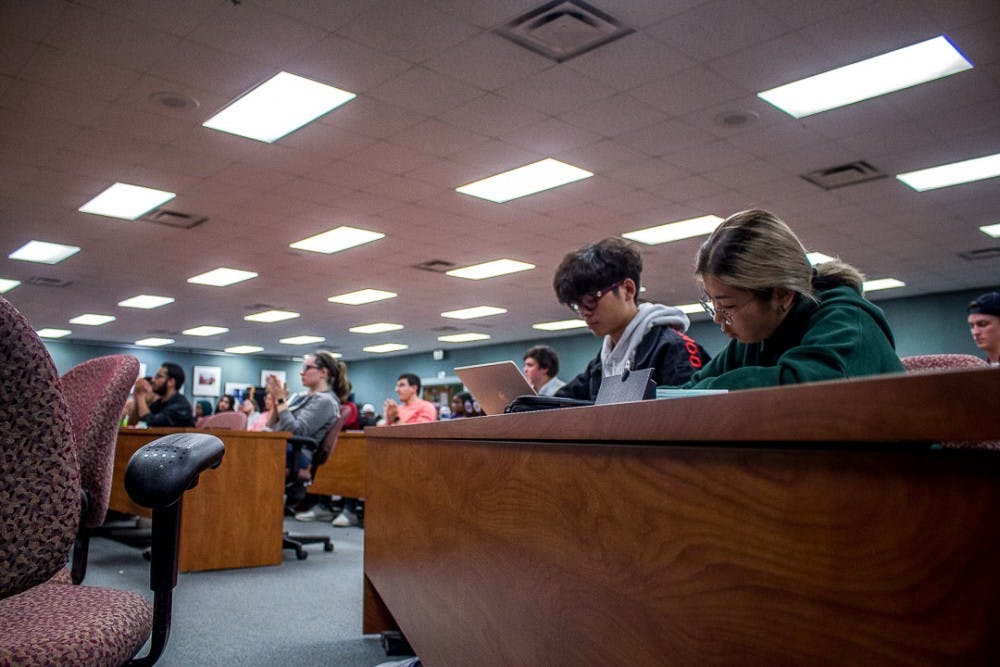For Michigan State Muslims, finals week falls during the holy month of Ramadan, causing worries for the students who partake in the holiday.
“Ramadan for Muslims, is the holiest month, it's a time where Muslims all over the world fast from sunrise to sunset,” President of the Muslim Students' Association Ahmad Hammad said. “It's time for unity, giving, family and happiness basically, a time to remember that God gave us those who have less than us.”
As the ninth month of the Muslim calendar, the month of Ramadan follows the Lunar calendar and shifts about 11 days every year. This year it begins on April 23, the Thursday before finals week, then continues through the entire week of finals.
On top of the stress that comes with finals week as is, some Muslim students will also have to manage the traditions of the religious holiday.
“People are fasting for I believe it's more than 12 hours because the days are so long,” Hammad said. “People start to get tired, lethargic and even "hangry," like they haven't had food all day, no water and you're just very hungry and then having to take something as stressful as a final, you know can be very stressful and anxious.”
This concern has been raised to MSU administration, he said.
“It is important for the university to support those who observe Ramadan,” MSU spokesperson Emily Guerrant said in a statement. “Part of having an inclusive and safe campus is understanding and educating ourselves on the importance and significance of the holiday and making sure our students, faculty and staff have the space and ability to practice their religion.”
While speaking at ASMSU’s general assembly meeting on Jan. 30, Interim Provost Teresa A. Sullivan was asked how the university was planning on accommodating the Muslim community at MSU. She said that the university has been reaching out to Muslim organizations on campus in order to get an idea of what they believe would help the students.
“One thing we were told was having more food available for the pre-dawn and post-sunset times would be helpful,” Sullivan said. “So the residence halls will be doing that and so will the library.”
Additionally, the Testing Center will allow students to take their finals earlier in the day without a fee, before the students get terribly hungry, and with the professor’s agreement, she said. Students will be responsible for speaking to their professor if this is something they are interested in doing.
Notices will be sent out to faculty as finals week comes closer so that they are aware accommodations might have to be made, Sullivan said.
“Faculty are required to provide religious accommodation, so this is not a favor they are doing you,” Sullivan said. “We’ll make sure this gets some publicity so it won’t strike anybody as ‘I never heard about this before.’”
According to Guerrant’s statement, the university currently has the following efforts underway.
Residence halls will make sure to have appropriate food available during the post-sunset and pre-dawn time periods. The university may also make food available in alternative locations like the library as well.
Faculty will be reminded of the religious observance policy and provided with information on how to make arrangements at the Testing Center to accommodate alternative testing times, as appropriate.
Space will be made available in the Anthony Hall Reflection Room to support the post-sunset prayer period.
Currently Hammad is in the works of meeting with Residence Education and Housing Services and ASMSU to discuss plans. He is hoping to work with ASMSU and their Student Allocations Board on a bill to help fund food for students after the dining halls close.
“I would like to get outside food for all Muslims on campus to be able to eat together because it goes back to the point of unity,” Hammad said.
Support student media!
Please consider donating to The State News and help fund the future of journalism.
Discussion
Share and discuss “Responding to Ramadan during finals week” on social media.








